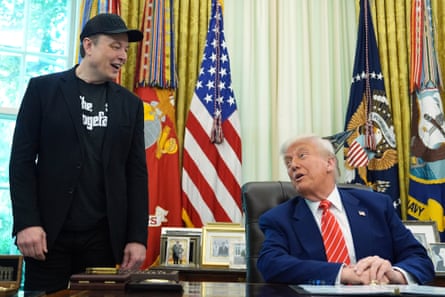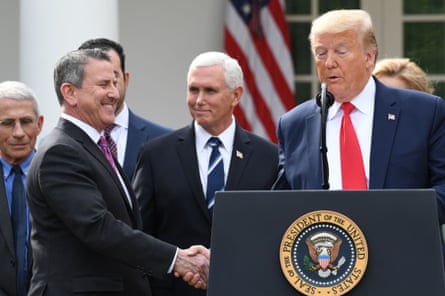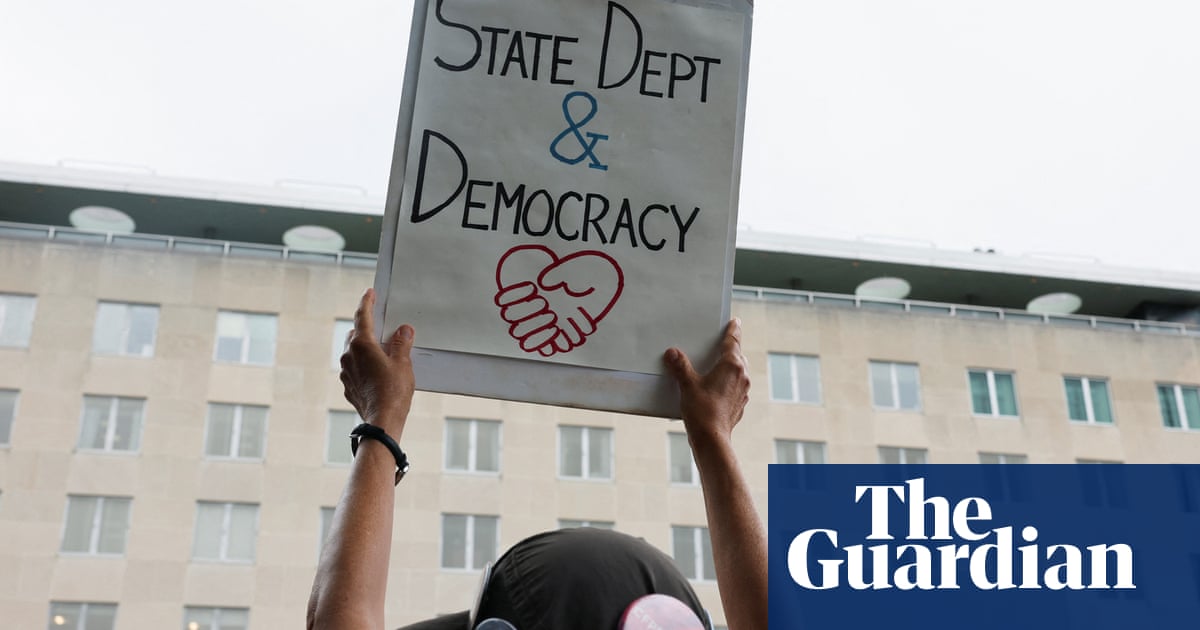From vast protests and all-caps social media posts to acrimonious legislative hearings and pugnacious White House statements, Washington has perhaps never been noisier. But since Donald Trump’s return to office, one corner of civil society has been almost eerily quiet.
Those leading corporate America rapidly turned down the volume after the president’s re-election. Gone are the days of political and social interventions, highly publicized diversity initiatives and donations to important causes.
For months, some of the most powerful firms in the world have nervously navigated a dangerous US political landscape, desperate to avoid the wrath of an administration as volatile as it is vocal.
“CEOs like two things. They like consistency and predictability,” said Bill George, former chairman and CEO of Medtronic and serial board director. “They like to know where things are going. No one can figure out where this administration’s really going, because everything is transactional.”

“Stay below the radar screen,” George has been advising senior executives across the US. “Do not get in a fight with this president.”
Industry leaders from David Solomon of Goldman Sachs to Dara Khosrowshahi of Uber extoled the benefits of “Trump accounts” for babies this week. It was the latest example of knee-flexing that began on the patio of Mar-a-Lago in the aftermath of Trump’s victory last November.
The genuflections have been backed by big money, with millions of dollars thrown into the president’s inaugural fund by companies and executives. That started to look like chump change before long. Amazon reportedly paid $40m for a documentary about Melania Trump. Apple announced plans to invest $500bn in the US.
But those moves do not appear to have bought much favor. The White House accused Amazon of being “hostile and political” following a report (upon which the company later poured cold water) that it would start disclosing the impact of Trump’s tariffs on prices. And the president threatened Apple with vast tariffs.
No CEO seemed closer to Trump than Elon Musk, the billionaire industrialist behind Tesla and SpaceX, who gave almost $300m to Republican campaigns last year, and worked in the administration for months. Their explosive fallout, days after Musk’s exit, prompted the president to threaten the cancellation of federal contracts and tax subsidies for Musk’s companies.

The pair’s rupture underlined why many executives are struggling to trust the president, according to Paul Argenti, professor of corporate communication at the Tuck School of Business at Dartmouth. “The mercurial nature of this guy kind of just seeps in, and people start to realize they’re dealing with something that’s a bit more difficult.”
His advice? “Proceed with extreme caution.”
“Loyalty only goes one way with Trump,” said Dan Schwerin, co-founder of Evergreen Strategy Group, and former speechwriter for Hillary Clinton, who has previously worked with firms including Levi Strauss and Patagonia. “This is like doing business with the mafia: you’re not going to win, and you’re not going to be safe.”
The standard playbook is clear: “You make a big splashy announcement: the details don’t matter, you don’t have to follow through, but you placate the White House,” said Schwerin. “That maybe buys you a little time and a little goodwill.
“But history suggests that Trump will do whatever is best for Trump, and he will turn on you in an instant, if it’s better for him. And that is true for his friends, so it will certainly be true for a company that he has no loyalty to.”
Extreme caution has become the name of the game – anything to avoid your company getting drawn into the crosshairs of this administration. But companies can’t just focus on the president: they have shareholders, customers and employees to answer to.

“You can’t base everything on getting through the next four years,” said George. “Yeah, it’s going to be chaotic. Yes, it’s going to be challenging. But you better hold firm to your purpose and your values.”
He pointed to retailer Target, where he served on the board for 12 years. “They were very, very big on differentiating themselves from Walmart, using diversity as the criteria – and particularly being, they called themselves, the most gay-friendly company in town.
“And then [Target CEO] Brian Cornell, six days after the inauguration, abandoned all that,” said George. The chain faced a backlash – and boycotts – for abruptly announcing the rollback of diversity, equity and inclusion (DEI) initiatives. Breaking his silence in an email to employees three months later, Cornell claimed: “We are still the Target you know and believe in.”
Contrast this with Costco, another retailer, which in January faced a shareholder proposal against DEI efforts from a conservative thinktank. The firm’s board robustly defended its “commitment to an enterprise rooted in respect and inclusion” before the proposal was put to its investors for a vote.
“They got a 98% vote to stay the course, to stay true to what they were,” said George. “And their customer base is very conservative. This is not like they have some liberal customer base.”
Argenti believes the period of strategic silence by many companies, and knee-flexing to the White House, might be coming to a close following Musk’s messy exit. “We’re at an inflection point,” he said. “There’s going to period where people realize you’re damned if you do and damned if you don’t.”
CEOs of companies counting the cost of Trump’s policies are “not going to suffer in silence”, he said. “You can’t win. It’s not like you can be secure in knowing if you follow this strategy, he’ll leave you alone.”

“We are starting to see the pendulum swing back,” according to Schwerin, who claimed the administration’s erratic execution of tariffs had “opened some people’s eyes” that its policies were bad for business.
“I think it’s crucial that we start to see a little more pushback. Better to have a backbone than to just bend the knee.”
On controversial issues at the heart of political discourse, however, George does not expect much of a shift from CEOs. “It is radio silence, and I think you’ll see that continuing. There’s not much to be gained from speaking out today.”
“Stick to your lane,” he has been counseling executives. “If you’re a banker, you can talk about the economy. If you’re an oil expert ... talk to the energy industry. But you can’t speak ex-cathedra to everyone else.”
“Only a handful” of business figures are deemed able to stand up and make bold public statements on any issue, according to George, who points to Jamie Dimon, the veteran JPMorgan Chase boss, and Warren Buffett, the longtime head of Berkshire Hathaway.
“There are certain people who are really hard to take on. Jamie’s one,” he said. “If you were president of the United States, would you take on Warren Buffett?”

 German (DE)
German (DE)  English (US)
English (US)  Spanish (ES)
Spanish (ES)  French (FR)
French (FR)  Hindi (IN)
Hindi (IN)  Italian (IT)
Italian (IT)  Russian (RU)
Russian (RU)  3 weeks ago
3 weeks ago
























Comments